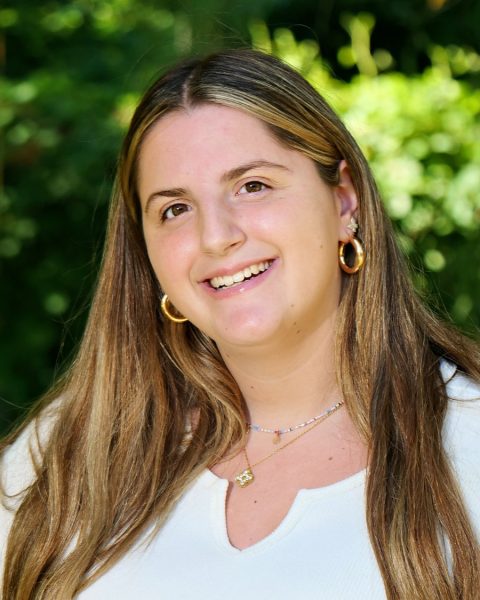Building better bonds
June 10, 2022
Freshman Adam Bachrach remembers how empty his house felt when his older brother, alumnus Josh Bachrach (‘21), left for college. They used to watch television together all the time and he enjoyed having another person in the house.
“There was no one to talk to,” Bachrach said. “So, my friends helped me cope with that loneliness and helped me pass the time.”
Even though they might seem insignificant, such moments, like just having someone to talk to, are essential to mental health. Licensed psychiatrist and CESJDS alumna Dr. Rochelle Drill has been working as a therapist for almost four years. She works with many ages but the majority of her patients are teenagers.
“A lot of the time the positive relationships are in the small moments: passing somebody a pencil, the hello in the hallway,” Drill said. “It doesn’t necessarily have to be those deep conversations that you have with certain people for hours in the middle of the night.”
When in a positive relationship of any kind, a person has more motivation and energy. Without these types of connections, normal activities become exhausting and less interesting because feelings of isolation are heightened.
During the COVID-19 pandemic, many people lost important connections due to lack of interaction with the people in their lives. They couldn’t build on or strengthen those relationships, and many of their social skills were lost. That makes it hard to create new relationships as society returns to normalcy.
“I think it can be helpful to think about the fact that, because we’ve all been forced into some level of isolation above and beyond what we’re used to,” Drill said. “Remember that everybody went through this as well. And that any feelings of isolation, anxiety or depression that you wonder if you’re alone, just remembering that you’re not alone, that other people went through this too.”
Relationships aren’t just friendships: they’re interactions with your family members, your teachers and even people you struggle to get along with. The following sections show how teens can strengthen their relationships with everyone in their circle, and even those outside of it. Many people believe that your relationships just need to be positive but not strong. However, this is not true. In order to maintain a mentally stable state, you need to have those relationships you can truly feel comfortable in.
Friends:
At JDS, many students have friends from outside activities. Through youth organizations like BBYO, NCSY, sleepaway camp and sports teams, many students’ friends don’t even go to JDS.
Maintaining relationships outside of school is equally as important as any. It is harder to maintain friendships from great distances but, those friendships shouldn’t be lost because of the distance.
“I’d say that my relationship with camp friends during the year is the same as the summer. Especially camp friends in the area,” Bachrach said. “So, I think that it [relationships with camp friends] is just as strong or even stronger than it is at camp.”
Students can start friendships with people outside of school through common interests. Having a common topic to discuss with a new friend makes you feel comfortable immediately and will eventually lead to a strong bond.
“Just being able to communicate with them [friends from BBYO] through social media, text, facetime… I think it’s really important, especially because we’re not at school together all day,” sophomore Abby Greenberg said.
Although it is important to have strong friendships within our school community, it is equally important to have strong relationships outside. Having friends who can offer a fresh perspective, minimal drama, and give you the opportunity to discuss things other than school work is important.
Making sure to keep in contact with these friends, even if it is limited, is crucial for these friendships.
Family:
Building strong bonds with those not in your age group can sometimes be tough. Many will admit that sometimes they don’t know what to discuss with grandparents or other family members. However, maintaining these relationships is just as important as those with your peers.
It might be hard to believe, but there are numerous things you and your family members can enjoy doing together. Discussing their childhood, classes you’re taking or even playing a board game can strengthen these relationships.
Having a family you can rely on and feel connected to is beyond important and is overlooked a lot during our high school years. Because we are so wrapped up in our social lives, it is often hard to find time to spend with family members. Nonetheless, this time is a necessity that we need to find a space for.
“To ensure that I have a good relationship with my family members, especially my sister, I make sure to let them know that I’m always there to talk with them and to help them with stuff,” freshman Abby Zuckerman said.
A key part of any relationship is finding ways to show appreciation for people and let them know that they are an important part of your life. It is especially important to show affection to your family because it is easy to take them for granted when they are always there.
Teachers:
Close relationships are a valuable part of any school environment. Without the ability to build strong, respectful relationships with teachers, students don’t feel connected to the subjects they are learning.
“I think one of the beautiful things about being in a private independent school is that you have close relationships between teachers and students,” High School Principal Dr. Lisa Vardi said.
Many of JDS’s special activities such as overnights, allow connections between students and teachers to strengthen.
“An example of that was on the Shabbaton when my friend group sat at the teachers table and we became friends with the teachers,” junior Hadas Kabik said. “It was really nice because now I know my teachers better.”
Because of COVID-19, virtual learning made contact between teachers and students scarce which made classroom learning tough. But that is beginning to change.
“I think this year especially being in-person, I am close with most of my teachers,” junior Talia Sporkin said. “I would definitely recommend younger students in ninth and tenth grade to start having strong relationships with their teachers.”
In extracurricular activities, although you should still have respect for authority figures, you have the ability to be more opinionated and be on more of an equal footing with an adviser. But in the classroom, your teachers are not just there to advise: they are in-charge.
Some ways to show teachers that you value them is to be respectful in class, go to them when you need help, say thank you before leaving and let them know if you’re struggling.
Peers that you are not fond of:
We often hear that you don’t need to be friends with everyone. But, civility towards those you interact with regularly is important.
“I think as long as you have an OK relationship with them [peers in extracurriculars that you don’t get along with] and you’re nice, then you can be successful and effective in what you’re doing without needing to be best friends with them,” sophomore Alec Silberg said.
In a school environment, it can be hard to get along with everyone. While students have many problems to deal with, teachers can also struggle in social situations.
“Pretty much everyone who’s an adult and works in a workplace with other people is going to have some people that rubbed them the wrong way or really annoyed them,” English teacher and JDS alumna Dr. Dory Fox said. “I don’t know that I ever really found a great way to deal with it. I think probably the best thing is to just try to be collegial.”
Especially in a small school, avoidance doesn’t always work. You might be seated next to someone you aren’t fond of, but switching your seat is not the best solution.
“You know, real-world post school, where you’re going to be interacting with people that you may not particularly enjoy, this is where it is particularly important to learn and utilize coping skills to manage feelings of stress and anxiety, particularly when it is necessary to manage big emotions in a workplace setting,” Drill said.








